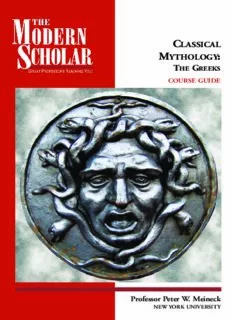
Classical mythology : the Greeks PDF
Preview Classical mythology : the Greeks
C LASSICAL M : YTHOLOGY THE GREEKS COURSE GUIDE Professor Peter W. Meineck NEWYORKUNIVERSITY Classical Mythology: The Greeks Professor Peter W. Meineck New York University RecordedBooks™isatrademarkof RecordedBooks,LLC.Allrightsreserved. ClassicalMythology: TheGreeks ProfessorPeterW.Meineck (cid:1) ExecutiveProducer JohnJ.Alexander ExecutiveEditor DonnaF.Carnahan RECORDING Producer-DavidMarkowitz Director-MatthewCavnar COURSEGUIDE Editor-JamesGallagher Design-AnjelaSnapko Lecturecontent©2004byPeterW.Meineck Courseguide©2004byRecordedBooks,LLC 7 2005byRecordedBooks,LLC Coverimage:Medusa©NatalyKochina/shutterstock.com #UT058 ISBN:978-1-4193-2984-5 Allbeliefsandopinionsexpressedinthisaudio/videoprogramandaccompanyingcourseguide arethoseoftheauthorandnotofRecordedBooks,LLC,oritsemployees. CourseSyllabus ClassicalMythology: TheGreeks AboutYourProfessor ...................................................4 Introduction ...........................................................5 Lecture1 TheNatureofGreekMyth ....................................6 Lecture2 ReligionandSociety .......................................11 Lecture3 IntheBeginningThereWasChaos ............................15 Lecture4 TheOlympians ............................................21 Lecture5 TheTrojanWar............................................26 Lecture6 MythasHistory ............................................30 Lecture7 DivineMyths ..............................................33 Lecture8 MythsofIdentity:TheOdyssey ...............................38 Lecture9 MythsoftheAfterlife........................................41 Lecture10 MythintoPolitics:Agamemnon ...............................46 Lecture11 GenderinMyth:TheWomenofTragedy ........................51 Lecture12 MythsofInitiation:TheHeroes................................55 Lecture13 MythsoftheCity:Oedipus ..................................59 Lecture14 MythsoftheCity:Athens ....................................62 CourseMaterials......................................................66 3 Meineck Peter Professor courtesyof About Your Professor Photo Peter W. Meineck © PeterW.Meineckisaclinicalassistantprofessorofclassicsandartistin residenceattheNewYorkUniversityCenterforAncientStudiesandthepro- ducingartisticdirectorandfounderoftheAquilaTheatreCompany.Peter currentlyteachesintheClassicsDepartmentatNewYorkUniversityin ancientdrama,Greekliterature,andclassicalmythology.Hehasheldteach- ingappointmentsatPrincetonUniversity,theUniversityofSouthCarolina, andtheTischSchooloftheArts.FellowshipsincludetheHarvardCenterfor HellenicStudies,Princeton,theUniversityofCaliforniaatSanDiego,andthe UniversityofTexasatAustin.Hehaslecturedandheldworkshopsonancient dramaandShakespeareatconferences,academicinstitutions,museums, festivals,andschoolsthroughouttheworld. Peter’spublicationsincludeAeschylus’Oresteia(HackettCambridge,1998); AristophanesVol.1-Clouds,Wasps,Birds(HackettCambridge,1998); Sophocles’OedipusTyrannuswithPaulWoodruff(HackettCambridge, 2000);Aristophanes’Clouds(HackettCambridge,2000);andTheTheban PlayswithPaulWoodruff(HackettCambridge,2002). HehastranslatedseveralGreekplaysforthestage(Clouds,Wasps,Birds, Philoctetes’Ajax,Agamemnon,andOedipustheKing).HefoundedAquilain 1991afterworkingextensivelyinWestEndtheatre,includingtheAldwych, theAlmeida,theEnglishNationalOpera,thePhoenix,theRoyalNational Theatre,theRoyalCourtTheatre,theRoyalOperaHouse,andSadler’s Wells.Petertrainedasalightingdesignerandhaslitandco-designedmany Aquilashows. HisworkasadirectorincludesAeschylus’Agamemnon;Sophocles’Ajax;a newplay,Villain,whichhealsoco-wrote;Shakespeare’sCoriolanus;and Aristophanes’Wasps. 4 m Kochina/shutterstock.co Nataly © Introduction InClassicalMythology:TheGreeks,widelypublishedprofessorPeter Meineckexaminesinthrillingdetailthefar-reachinginfluenceofGreekmyths onWesternthoughtandliterature.Thenatureofmythanditsimportanceto ancientGreeceintermsofstorytelling,music,poetry,religion,cults,rituals, theatre,andliteratureareviewedthroughworksrangingfromHomer’sIliad andOdysseytothewritingsofSophoclesandAeschylus.Throughthestudy ofthesetime-honoredmyths,theGreekheroesandgods—including Heracles,Zeus,Achilles,Athena,Aphrodite,andothers—leapfromthepage inalltheirglorioussplendor.Thefollowinglecturesarenotonlyanentertain- ingguidetoGreekmythology,butalsoafascinatinglookintothecultureand timethatproducedtheseeternaltales. 5 Lecture1: TheNatureofGreekMyth TheSuggestedReadingforthislectureisG.S.Kirk’sNatureofGreek Myths,section1. Introduction ThemythologyoftheGreekshashadaprofoundinfluenceonWestern thoughtandliterature,yetmythsthemselvesareverydifficulttocategorize. TheGreekswerecloselyconnectedtotheirmythictraditionviastorytelling, music,poetry,religiousandcultpractice,ritualsandfestivals,theatricalper- formances,andliterature.Thislecturewillsetoutabasicframeworkfor understandingthemeaningoftheterm“myth,”thedifferenttypesofmyth, andvariousapproachestothestudyofmythology.Wewillalsocreatesome contextforourcoursewithabriefdescriptionofthemainperiodsofGreek historyandanoverviewofthelandscapeandclimateofGreece. WhatIsMyth? ThemythologyoftheGreekshashadaprofoundinfluenceonWestern thoughtandliterature. Theterm“myth”isderivedfromtheGreekmythos,whichmeans“aspoken story,”“speech,”orsimply“theplot.”Thefifth/fourth-centuryAthenianphiloso- pherPlatocontrastedmythoswiththetermlogos,meaning“account.”The tellerofalogostakespersonalresponsibilityforwhattheysay,whereasthe speakerofamythosrelatesatraditionalstory,onethatis“handeddown”; hencetheLatintermtrado—to“handover.”Aristotlecametoequatemythos withfictionandseeitasactingliketheplotofaGreektragedy,capableofpro- ducingcatharsisor“healing”throughthesharedexperienceoftheaudience. TheRomansnamedtheirmythologicalstoriesfabulae,regardingmanyofthem asmerefables. Originally,Greekmythswerehandeddownbywordofmouth,viathesongs ofbards,atritualgatherings,orsimplyviaoralstorytelling.Bytheeighthcen- turyBCE,thesestoriesbegantobewrittendownandtookonatextualform inworkssuchasHomer’sIliadandOdyssey.Mythsbecamehighlymutable astheydevelopedthroughthecourseoftheiroraldelivery.Theychangedto reflectlocalcustoms,socialandpoliticalconditions,andcontemporarytastes. Asmythsbecamerecodedaswrittentexts,differentversionswithvaried plotsemerged. Allculturesseemtohavedevelopedsomesortofmythological narrative.Therearenumerousparallelsandpointsofcontactbetween E thevarioustraditions. N O Examplesinclude: E R U TheBabylonianepics,suchastheEnumaElish T C E L 6 Sanskritpoetry,suchastheMahabharata ThefirstbooksoftheOldTestament TheVikingsagas TheNativeAmericanoraltradition TheArabianNights ThestoriesofKingArthur,theKnightsoftheRoundTable,andtheHolyGrail TherichtraditionofAfricanmythology TheIncacreationstories TypesofMyth Itisincrediblydifficulttocreateaclearsystemforcataloguingmythology. Thefollowingthreetypesofmythcanestablishonlythebroadestofoutlines. Manymythscontainelementsofeach. EtiologicalorDivineMyths Theterm“etiological”isderivedfromtheGreekwordaitia,meaning“cause,” andisusedtodescribeatypeofmyththatarticulatesnaturalphenomenaor theactionsofdivineforces.Thisincludescreationmyths,storiesconcerning thegods,andaccountsofthetimebeforehumankind.Godsareoftendepicted asforcesofnature(forexample,Zeusistheskygodandhisweaponisthe lightningbolt),ortheypersonifyapowerfulemotiveforce,suchasAphrodite, whoencapsulatesdesireandsexualpassion.Etiologicalmythscanalsobe viewedasatypeofprimitivescienceinwhichmythsareusedtoexplainmat- tersbeyondtheboundsofknowledge. HeroicMythsorLegends Thesekindsofstoriescanbestbedescribedasmythologicalmemoriesof thehumanpast.Herethemaincharactersaremortal,notdivine,although manyarerelatedtothegodsinsomewayandhavelarger-than-lifeattributes. Theytendtoreflectanaristocratic“hero”class,greatleaderswhosedeeds havebecomeenshrinedinmyth,suchasHeracles,Achilles,Jason,and Theseus.Oftentheseheroesarehelduptoreflectanextremeexampleof humanbehaviorandthepositiveandnegativeeffectsthiscauses.These kindsoflegendsoftencontainelementsofhistoricalmemory,suchasthe mythologicalaccountsoftheTrojanWar.Thesemayreflectarealconflictthat occurredinthedistantpast,andportrayelementsofamucholderculture. TraditionalFolkStories Folktalesareusedtoarticulatehumancommonalities,suchassocietal fears,importantritesofpassage,andmoralguidance.Examplesoffolktales inGreekmythologyincludethefablesofAesop,thecentralbooksofHomer’s Odyssey,andstoriesofgreattrialsorquests,suchasthemythsofPerseus andJason.Thesetalescontainrecognizablemotifs,suchastheuseofitems imbuedwithmagicpower,anescapefromdangerusingtrickery,orsexual conquestafterthepassingofaninitiationrite. 7 MethodsofStudyingMyth Allegorical—Rationalizesmythsasmetaphorsforhumanbehaviorandcus- toms.ThistypeofstudycanbetracedbacktotheHellenisticthinker Euhemerus(c.300BCE). Comparative—Examinesthesimilaritiesanddifferencesinherentinthe mythologiesofdifferentcultures.TheworkofJosephCampbellusesthis method. Ritualism—Theconnectionbetweenreligiousritualsandmythology.Athe- oryadvocatedbytheCambridgeSchoolintheearlytwentiethcentury. Frazer’stheGoldenBough,Graves’theWhiteGoddess,andtheworks ofJaneHarrisonandF.M.Cornfordarenotableexamplesofthisschool ofthought. Psychological—SigmundFreudusedmythicstoriestodemonstratehisthe- oriesonhumanmentaldevelopmentandtheeffectsofthepersonal unconscious.Hisfamousterms“Oedipuscomplex”and“Electracom- plex”aredrawnfromthemythicaccountsofGreektragedy.CarlJung advancesatheoryofacollectiveunconscioususingthecommonalities inherentinmythasevidence. Functionalism—MainlyadvocatedbyanthropologistssuchasBronislav Malinowski,whostudiestheTobriandislandersofNewGuinea.Here mythsareseenaschartersofsocialcustomsandbeliefs,oftendealing withculturaltaboos. Structuralism—Theanalysisofmythsascomponentparts.ClaudeLévi- Straussdetailedabinarystructureandobservedanegotiationandresolu- tionofopposingforces.VladimirProppdocumentedthirty-onedistinct motifsasunitsofrecurringpatterns.WalterBurkertblendedstructuralism andhistoricalperspectivetouncoveressentialmeaningbehindmyths. TheGeographyofGreece TheGreeklandscapeandclimatehadaprofoundeffectonancientGreekcul- tureandmythology.GreecehasatemperateMediterraneanclimate,withwarm summersandmildwinters.Thisledtothedevelopmentofaculturethatlived muchofitscivicandsociallifeoutside.Inmythology,exteriorspacetendstobe therealmofmen,thestate,andgovernment,whileinteriorspaceisattributed towomen,thehome,andprivacy.MostcommunitiesinGreecewerevery closetotheseaorsituatedonanisland.Arelianceonseafaringfortradeand warfareledtothefluentexchangeofculturalinfluencesapparentinGreek mythology.BecausetheGreekmainlandisbrokenupbylowmountainranges, communitiesdevelopedinisolation.Thisledtotheemergenceoflocalized mythictraditions.TheruggedlandscapeofGreeceproducedtheolive,thevine, andhardcerealssuchasbarley.Theseproductswerewidelyexported,allow- ingforthespreadofmythologyviadevicessuchasiconographyonpainted vasesandtheexportofsculpture.ThecycleoftheGreekagriculturalyearis E N alsostronglyreflectedinGreekmythandritualpractice. O E R U T C E L 8 HistoricalPeriodsofAncientGreece EarlytoMiddleBronzeAge (3000to1600BCE) •BeginningofMinoanPalacecultureonCrete/Thera •CycladiccultureintheAegean LateBronzeAge (1600to1100BCE) •MycenaeancultureonGreekmainland •HeightofMinoanculture-1400BCE •DestructionofTroyin1250BCE DarkAge (1100to800BCE) •Collapseofpalaceculture ArchaicPeriod (800to480BCE) •Foundationofthepoliscity-state •ColonizationbyGreeks •DevelopmentofGreekwriting ClassicalPeriod (480to323BCE) •DefeatofPersianforcesledbyAthensatSalamisin480 •DevelopmentofdemocracyinAthens •Emergenceofhistory,philosophy,rhetoric,drama HellenisticPeriod (323to31BCE) •DeathofAlexanderin323BCE •SpreadofHellenicculturethroughoutAlexander’sformerempire •ConquestofHellenicworldbyRome—fallofAlexandriain31BCE 9
Description: